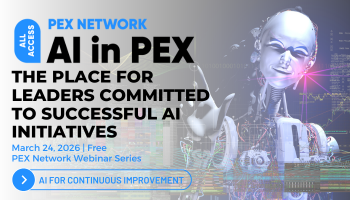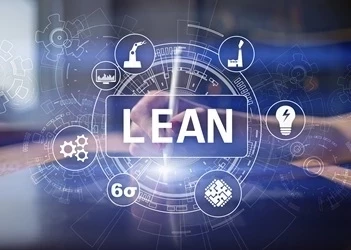Reskill, lead & win: The new PEX imperative in a time of transformation
Tony Saldanha believes it is time for process excellence professionals to seize the moment and revolutionize business operations
Add bookmark
Process excellence faces an inflection point driven by transformation. Businesses are in the midst of a revolution – the Fourth Industrial Revolution. For process excellence professionals, a combination of work processes and digital capabilities can drive tangible competitive advantages in modern organizations.
Tony Saldanha, co-founder of Inixia and instructor of the Certified Master of Dynamic Process Transformation program, believes it is time for process excellence professionals to seize the moment and revolutionize business operations.
Saldanha will be speaking at All Access: Change Management for Business Transformation 2025, sharing his secrets on crafting a winning approach. Ahead of the event, PEX Network sat down with him to explore how professionals can establish credible leadership and reskill themselves and others for success.
Join the PEX Network community

Don't miss any news, updates or insider tips from PEX Network by getting them delivered to your inbox. Sign up to our newsletter and join our community of experts.
Learn MorePEX Network: You’ve spoken about the Fourth Industrial Revolution. In your view, what makes this revolution fundamentally different from the previous ones, especially for process excellence professionals?
 Tony Saldanha: This one is significantly more disruptive. For context, the first industrial revolution was about steam engines, the second one was about electricity, the third was about the internet and this one is about digital technologies. The first three were about individual disruptive technologies, but digital cuts across all other technologies.
Tony Saldanha: This one is significantly more disruptive. For context, the first industrial revolution was about steam engines, the second one was about electricity, the third was about the internet and this one is about digital technologies. The first three were about individual disruptive technologies, but digital cuts across all other technologies.
For example, digital is disrupting physical technologies (e.g. manufacturing), medical technologies (e.g. the genome), social behaviors (e.g. social media) and so on. No industry or function is safe. Secondly, the pace of change is exponentially faster. It took the telephone 50 years to reach 50 million users, but ChatGPT got there in two months. Most importantly, the need for transformation for survival is more urgent – 90 percent of organizations are undergoing digital transformation, a rapid increase from 50 percent in 2018. This makes the role of process excellence professionals all the more critical. The number one priority for most boards of directors is business transformation and process excellence leaders squarely play in that zone.
PEX Network: How can the combination of process and digital capabilities impact competitive advantage in today’s organizations?
TS: Process and digital capabilities are a killer combo. Recent studies prove that one-third of a company’s competitive advantage, as measured by stock price growth, comes from internal work process effectiveness. The remaining comes from its products and services. This statistic is huge, because it provides a direct link between the work of process excellence professionals and competitive advantage.
Historically, functional processes like finance, HR and supply chain have been considered as the cost of doing business. That changes now. The expectation from the modern process excellence leader is not just to provide high quality and affordable transactional support to the business, but to actively contribute to competitive advantage. That emphasizes their role as transformation agents.
PEX Network: What do you see as the most distinctive, yet often underappreciated, value that process excellence leaders bring to the table?
TS: This goes back to the previous question and the transformational role of process excellence people. In the past, process work has been thought of as a commodity – i.e. something in the background which happens with as high reliability and low cost as possible. To be clear, this is not without merit. As process excellence leaders, we have to deliver cost efficiency and strong reliability. However, these are simply table stakes. The modern process leader must additionally play the role of a transformation engine of business processes for competitive advantage. Unfortunately, this additional role has been underappreciated, both by business leaders and process excellence professionals, until now!
Join us at All Access: AI in Business Transformation 2025!
PEX Network: Why do process excellence professionals struggle to gain recognition as change leaders, even when they’re clearly delivering value?
TS: There are several reasons. These includes the ability of process excellence PEX people to influence the business, to lead rather than take orders and to tell their own story, among others. The traditional skillset which made process professionals great was one of process excellence. However, that’s one of perhaps three skillsets for a modern leader. Just because you do great work in the backroom doesn’t mean that you will be recognized as a change leader.
Beyond process excellence, the ability and empowerment to lead via influence is a crucial skillset in its own right. Then, there’s the skillset of business acumen, which is the understanding of what outcomes the business needs from our processes.
Back to your question of why process excellence professionals might not get the recognition they deserve, it’s possible that they are not empowered to be change leaders. However, in my experience there’s equally an opportunity to develop leadership and business acumen skillsets.
PEX Network: What are the first steps a process excellence leader should take to start building credible leadership?
TS: The first thing is to recognize that if the work processes are broken then the foundation to build credibility is shaky. So, start by fixing service quality and cost. Don’t talk about competitive advantage and broader value creation if the basics are not in place. However, once you have a good foundation, then it is important to create a personal vision of how your processes will create a broader competitive advantage, which goes beyond the basics of cost and quality.
This personal vision needs to be translated into business outcome and value. This incremental value must be articulated in terms of Wall-Street type metrics like revenue, profit, cash, cycle time etc. Then, this needs to be socialized and sold to stakeholders. As you do that, keep in mind that you’re also educating them that there’s more untapped value in process excellence than imagined. It may take several attempts and a few false starts before this gains traction.
PEX Network: As technology evolves rapidly, what are the top skills process excellence leaders need to invest in to remain relevant and effective?
TS: The fact is that as the technology and the process excellence industry evolves, the top skills must evolve from process excellence operations to PEX+ “McKinsey Consulting” skills. Process excellence operations requires subject matter expertise in a given process, operations management and process transformation management skills. However, as I mentioned earlier, these skills are “necessary but not sufficient” for modern leaders. We must add leadership influence capabilities and business acumen skills.
You will have noticed that I did not say things like artificial intelligence (AI) skills. That’s because sufficient knowledge of AI use cases is a given for process operations, redesign, leadership influence and business acumen. There’s no getting away from that, but the good news is that process excellence leaders don’t have to be AI technology experts. They have to be AI use case experts. That is more practical and easier. Our training and certification programs deliver all of these mentioned skills.
Register for All Access: BPM Business Process Management 2025!
PEX Network: How should organizations support the reskilling of their process excellence teams to meet digital transformation goals?
TS: That’s a great question. This is where great organizations distance themselves from the rest. There is recognition that the ROI for reskilling existing process excellence staff is much higher than with firing and hiring new staff. Great organizations create a deliberate reskilling strategy.
A good strategy tends to be holistic – identifying training programs, creating skill journey maps for staff to self-plan competency development and tying skills and competency plans to talent promotion. Some leading-edge organizations are even starting to consolidate HR and IT organizations to design a digital workforce which has both bots and humans. However, keep in mind that this is futuristic for most organizations. Simply creating a traditional reskilling strategy is fine.
All Access: AI in Process Excellence 2026

Don’t get left behind. Join us at All Access: AI in Process Excellence to learn from leading experts, thought leaders, and practitioners who are on the ground experimenting, researching, and learning how to best use AI. They will share their secrets with you for free. And you’ll have the opportunity to network with fellow professionals as we navigate this new world. Register now to save your spot.
Learn More












